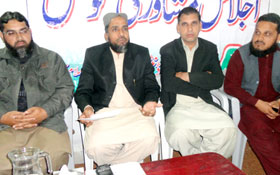 Federal Minhajian Forum, a representative organization of graduates of Minhaj
University Lahore living in the federal capital, met in their office in Karachi
Company in G-9 sector of Islamabad on November 28. The highlight of the meeting
was telephonic speech of Dr Hussain Mohi-ud-Din Qadri. The guest of honour
on the occasion was Allama Rana Muhammad Idrees Qadri, whereas Prof Abdul Quddus Durrani,
president of the Forum, presided over the programme.
Federal Minhajian Forum, a representative organization of graduates of Minhaj
University Lahore living in the federal capital, met in their office in Karachi
Company in G-9 sector of Islamabad on November 28. The highlight of the meeting
was telephonic speech of Dr Hussain Mohi-ud-Din Qadri. The guest of honour
on the occasion was Allama Rana Muhammad Idrees Qadri, whereas Prof Abdul Quddus Durrani,
president of the Forum, presided over the programme.
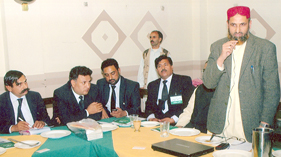 The distinguished among the gathering were Allama Sohail Ahmad Siddiqui, Shahzad Rasool Qadri, Ch Bashir Ahmad Advocate, Ch Imtiaz Ahmad Advocate (Chairman Wisdom Lawyers Forum), Shahzad Bhatti Advocate (Chairman National Lawyers Forum), Asif Maher Advocate (former vice president of Ferozwala Bar Association), Ishtiaq Ahmad Ch Advocate (President of National Lawyers Forum), SM Murid Bhutta (Chairman PAO Lawyers Group), Sheikh Yasir Khalil Advocate (former vice president Lahore Bar Association), Sardar Ghazanfer Hussain Advocate and Nasir Iqbal Qadri Advocate.
The distinguished among the gathering were Allama Sohail Ahmad Siddiqui, Shahzad Rasool Qadri, Ch Bashir Ahmad Advocate, Ch Imtiaz Ahmad Advocate (Chairman Wisdom Lawyers Forum), Shahzad Bhatti Advocate (Chairman National Lawyers Forum), Asif Maher Advocate (former vice president of Ferozwala Bar Association), Ishtiaq Ahmad Ch Advocate (President of National Lawyers Forum), SM Murid Bhutta (Chairman PAO Lawyers Group), Sheikh Yasir Khalil Advocate (former vice president Lahore Bar Association), Sardar Ghazanfer Hussain Advocate and Nasir Iqbal Qadri Advocate.
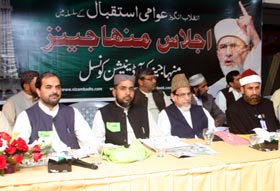 Shaykh-ul-Islam addressed the Minhajians in the concluding session. He threw light on the prevailing situation in the country in his brief address. He said that the masses were undergoing one crisis after the other. Living a decent life had become a dream given skyrocketing inflation, price hike and dearness. He said that a vast disconnect had emerged between the ruling elite and the masses. He said that in these circumstances, it was important to play oneтАЩs role to shore up the things.
Shaykh-ul-Islam addressed the Minhajians in the concluding session. He threw light on the prevailing situation in the country in his brief address. He said that the masses were undergoing one crisis after the other. Living a decent life had become a dream given skyrocketing inflation, price hike and dearness. He said that a vast disconnect had emerged between the ruling elite and the masses. He said that in these circumstances, it was important to play oneтАЩs role to shore up the things.
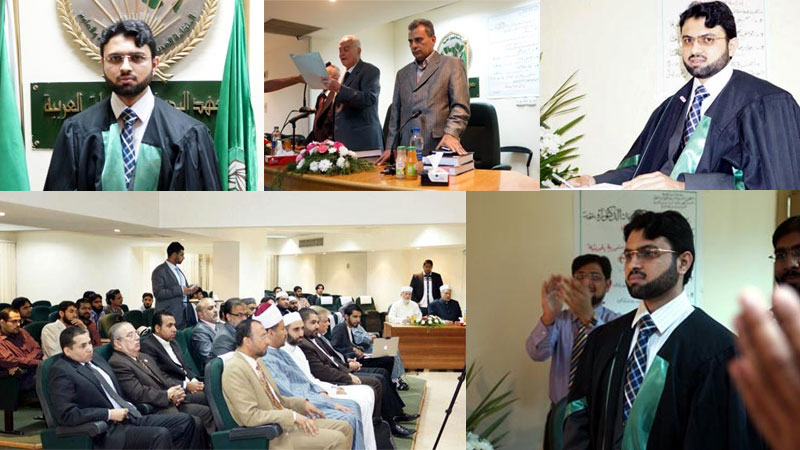 Sahibzada Hassan Mohi-ud-Din Qadri, President of MQIтАЩs Supreme Council and elder son of Shaykh-ul-Islam Dr Muhammad Tahir-ul-Qadri, has completed his PhD from Arab League University. His viva voce was conducted on November 3, 2012. The subject of his thesis was тАЬConstitution of Medina and Modern Constitutional Principles (A Comparative and Analytical Study).тАЭ The thesis was written in Arabic language and covers around 800 pages.
Sahibzada Hassan Mohi-ud-Din Qadri, President of MQIтАЩs Supreme Council and elder son of Shaykh-ul-Islam Dr Muhammad Tahir-ul-Qadri, has completed his PhD from Arab League University. His viva voce was conducted on November 3, 2012. The subject of his thesis was тАЬConstitution of Medina and Modern Constitutional Principles (A Comparative and Analytical Study).тАЭ The thesis was written in Arabic language and covers around 800 pages.
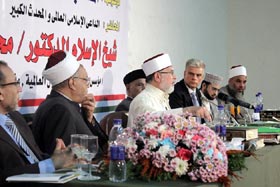 Speaking to a large audience which consisted of mainly learned scholars, teachers, heads of departments including Vice Chancellor of Grand Al Azhar University, Shaykh-ul-Islam Dr Muhammad Tahir-ul-Qadri said тАЭWithout believing in the authority of all Hadith books (especially Sihah Sitta), we cannot understand, reject or challenge the authenticity of Hadith Books other than Bukhari and Muslims.
Speaking to a large audience which consisted of mainly learned scholars, teachers, heads of departments including Vice Chancellor of Grand Al Azhar University, Shaykh-ul-Islam Dr Muhammad Tahir-ul-Qadri said тАЭWithout believing in the authority of all Hadith books (especially Sihah Sitta), we cannot understand, reject or challenge the authenticity of Hadith Books other than Bukhari and Muslims.
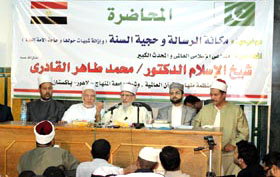 On October 22, Shaykh-ul-Islam Dr Muhammad Tahir-ul-Qadri delivered a lecture to students of Al-Azhar University. A large number of students including representatives of WAAG attended the lecture in large numbers. In his speech, Al-Azhar University was an ancient seat of learning and playing its role in propagating the Islamic message of peace, interfaith dialogue, moderation and tolerance.
On October 22, Shaykh-ul-Islam Dr Muhammad Tahir-ul-Qadri delivered a lecture to students of Al-Azhar University. A large number of students including representatives of WAAG attended the lecture in large numbers. In his speech, Al-Azhar University was an ancient seat of learning and playing its role in propagating the Islamic message of peace, interfaith dialogue, moderation and tolerance.
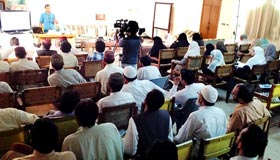 Principal of COSIS Dr Obaidullah Ranjha said in his remarks on the occasion said that the teachers would have to focus on the use of modern teaching facilities such as multimedia etc. to improve their teaching. He said that they also needed to expand the horizon of their studies besides focusing on the grooming of the students in accord with modern demands of market.
Principal of COSIS Dr Obaidullah Ranjha said in his remarks on the occasion said that the teachers would have to focus on the use of modern teaching facilities such as multimedia etc. to improve their teaching. He said that they also needed to expand the horizon of their studies besides focusing on the grooming of the students in accord with modern demands of market.
 Recent decades have seen the worldтАЩs great faith and cultural communities torn apart by misunderstandings and mistrust to such an unfortunate degree that people of good intentions towards each other are now compelled to declare their unequivocal rejection of the beliefs and activities that divide them and their unreserved embrace of the beliefs and activities that unite them.
Recent decades have seen the worldтАЩs great faith and cultural communities torn apart by misunderstandings and mistrust to such an unfortunate degree that people of good intentions towards each other are now compelled to declare their unequivocal rejection of the beliefs and activities that divide them and their unreserved embrace of the beliefs and activities that unite them.
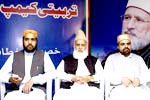 A special sitting of graduates and alumni of Minhaj University with Shaykh-ul-Islam Dr Muhammad Tahir-ul-Qadri was held in the central secretariat of MQI on April 16, 2011 Lahore. The meeting was attended by the central leadership of MQI, teachers and students of Minhaj University and the hundreds of Minhajians from across Pakistan.
A special sitting of graduates and alumni of Minhaj University with Shaykh-ul-Islam Dr Muhammad Tahir-ul-Qadri was held in the central secretariat of MQI on April 16, 2011 Lahore. The meeting was attended by the central leadership of MQI, teachers and students of Minhaj University and the hundreds of Minhajians from across Pakistan.
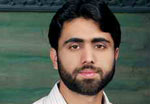 Sayyid Haider Ali Bokhari, a graduate of College of Shariah and Islamic Sciences (Minhaj University), has won first position in an examination for lectureship held under the aegis of Federal Public Service Commission. He has been appointed as lecturer in Islamabad Model College.
Sayyid Haider Ali Bokhari, a graduate of College of Shariah and Islamic Sciences (Minhaj University), has won first position in an examination for lectureship held under the aegis of Federal Public Service Commission. He has been appointed as lecturer in Islamabad Model College.